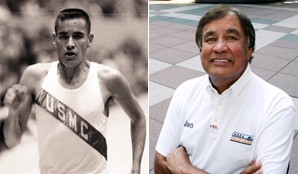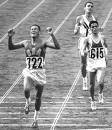 |
| Billy Mills, then and now (http://sportsillustrated.cnn.com/2008/ olympics/2008/07/01/mills.cuw) |
There comes a time in everyone's life when they aspire to be like another. This may be the result of what someone has said, done or achieved. People have dreams of achieving almost impossible goals, or giving back to a community or to motivate others to fulfill their own dreams and make the lives of others better. It is the pursuit of one's own dreams and achieving them and passing the pursuit on to others that I believe makes someone a hero. Billy Mills is one of those people. Billy Mills is a man who lives with dignity, character and pride. Billy Mills has obtained the ultimate athletic goal of winning an Olympic gold medal in the men's 10,000 meters, and for nearly 50 years, Mills has channeled his love for running into a passion for fighting against poverty and for encouraging Native American youth to believe in the power of their dreams.
Billy Mills was born on June 30, 1938 in Pine Ridge, South Dakota. He is an Oglala Lakota (Sioux) Indian and was raised on the Pine Ridge Indian Reservation. Billy's given Lakota name is Makata Taka Hela which means "love your country." Billy grew up in poverty and was orphaned at the age of 12. He turned to sports as a positive focus in his life and took up running at an Indian boarding school in Lawrence, Kansas.
In the late 1950s he attended the University of Kansas on an athletic scholarship. Billy's adjustment to the University came with many hardships. This was his first time living away from the Indian reservation, and he was not always welcomed as an Indian on the track team or at the university. Bill Easton, the university coach, was hesitant about Billy running for the team. Easton told Billy that he would quit, just like all other Indians that had run for him. These challenges did not stop Billy from pursuing his dream of completing college and running in the 1964 Olympic Games. Billy excelled as a runner and was named an NCAA All-American cross-country runner three times. He won the individual title in the Big Eight cross-country championship, and the University of Kansas track team was the 1959 and 1960 outdoor national champions. Billy graduated with a B.S. in physical education.
 |
| 1964 Men's Olympic 10,000 meter finish (www.stripes.com/ photoday/040504.jpg) |
After college, Billy was commissioned as a lieutenant in the U.S. Marine Corps. Billy continued to run and posted times good enough to qualify for the 1964 Tokyo Olympic Games. No American had ever won the 10,000 meter race in an Olympics. Billy was not considered a threat to the world record holder, Ron Clarke of Australia, or Mohammad Gammoudi of Tunisia. Mills went unnoticed in the field of world record holders at these Olympic Games. Billy ran with the best in the world that day. Billy remembered the words of his father, an avid storyteller:
"You have to look deeper, way below the anger, the hurt, the hate, the jealousy, the self-pity, way down deeper where the dreams lie, son. Find your dream. It's the pursuit of the dream that heals you."
Billy Mills became the first and only American to this day to have ever won the Olympic 10,000 meter race. Mills' victory is considered one of the greatest upsets in Olympic history.
The story of Billy Mills could end right there and Mills would be a hero throughout history, but the story of Mills continues. Billy stated:
"In Native American culture, if you bring pride and respect to yourself, you are asked to give back to the people who helped you. It's called a 'giveaway.' I decided that my giveaway would be the inspiration that was given to me. I'd pass it on to another generation."
In 1983 Hollywood released the movie entitled Running Brave based on Billy's life. In 1986, Mills became a spokesperson for a Christian Relief Service that had a passion for Native American causes; that organization founded the charity Running Strong for American Indian Youth, which supports cultural programs and provides health and housing assistance for Native American communities. Mills has used his fame to help children that face the same poverty and rejection that he had battled throughout his own childlhood. Mills uses his words to teach younger generations about character, dignity and pride. His main focus is on teaching Global Unity Through Global Diversity. Billy estimates that the Running Strong group has raised more than $212 million in contributions. "It's a tremendous feeling, knowing that one moment in time, winning a gold medal at the Olympic Games or just crossing the finish line can structure a way in which you can give back and affect multitudes of lives worldwide, and especially in your own community."
Billy Mills now lives in Sacramento, CA with his wife Patricia and is working as a public speaker through his own business, the Billy Mills Speakers Bureau. In 1984, he was inducted into the United States Olympic Hall of Fame. In 1991 Billy teamed up with author Nicholas Sparks and wrote a book entitled, Wokini: A Lakota Journey to Happiness and Self-Understanding. In 1997, Mills was made a member of the Sports Humanitarian Hall of Fame, and in 1999 Mills was inducted into the National Distance Running Hall of Fame. In February of 2003, the University of Kansas established the "Billy Mills Running Strong for American Indian Youth Scholarship."
In my mind and in my athletic pursuits, it is mind boggling to find out just what it is inside a person that drives them so deep to pursue their own dreams of winning an Olympic gold medal. Just by being a Sioux Indian, Billy faced more obstacles than I can even imagine. Billy Mills is quoted as saying,
"The ultimate is not to win, but to reach within the depths of your capabilities and to compete against yourself to the greatest extent possible. When you do that, you have dignity. You have the pride. You can walk about with character and pride no matter in what place you happen to finish."
Because of Billy's Olympic accomplishments and his humanitarian gifts, I call Billy Mills one of my heroes.
Page created on 11/4/2009 12:00:00 AM
Last edited 1/6/2017 11:43:45 PM
